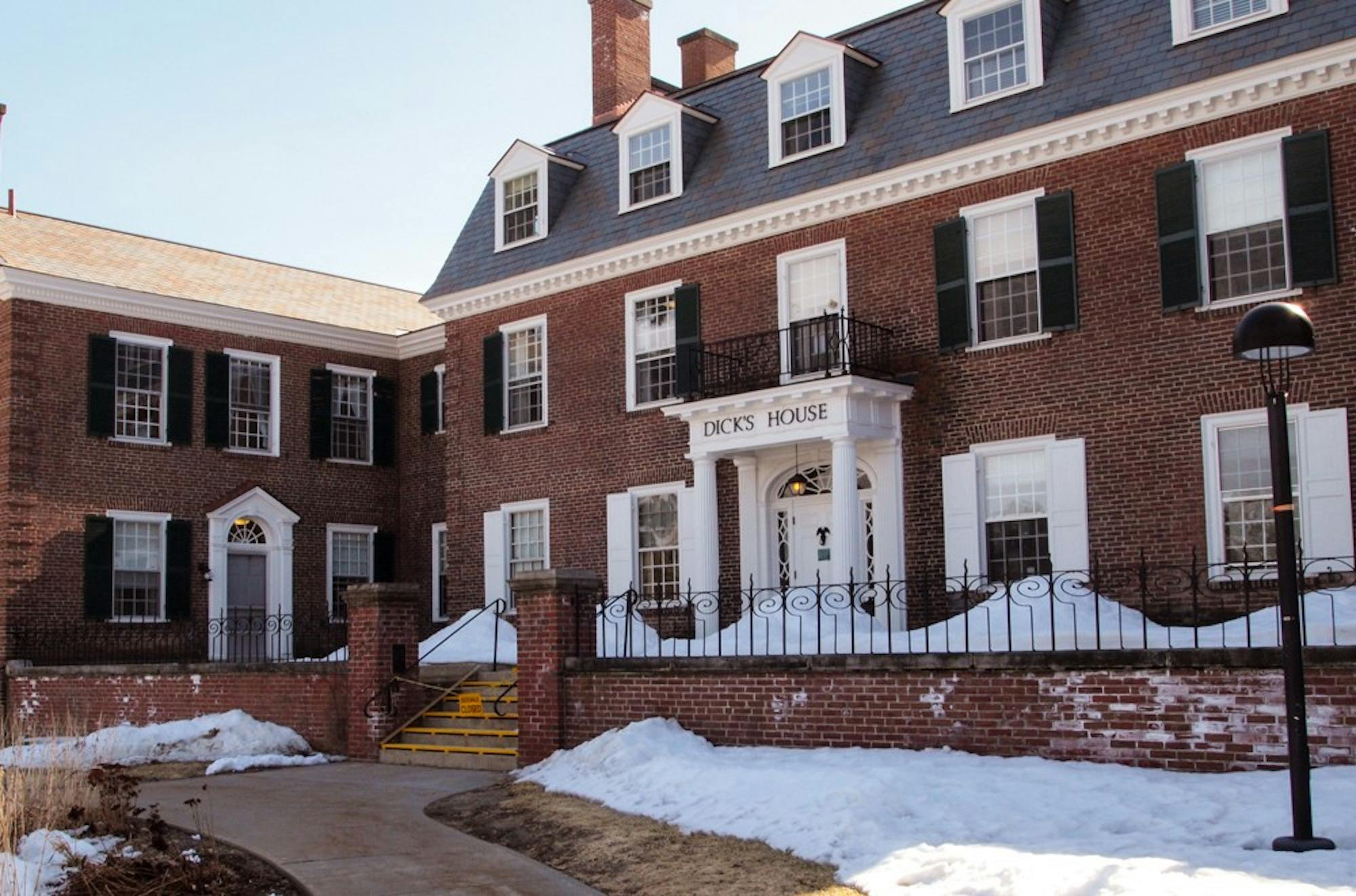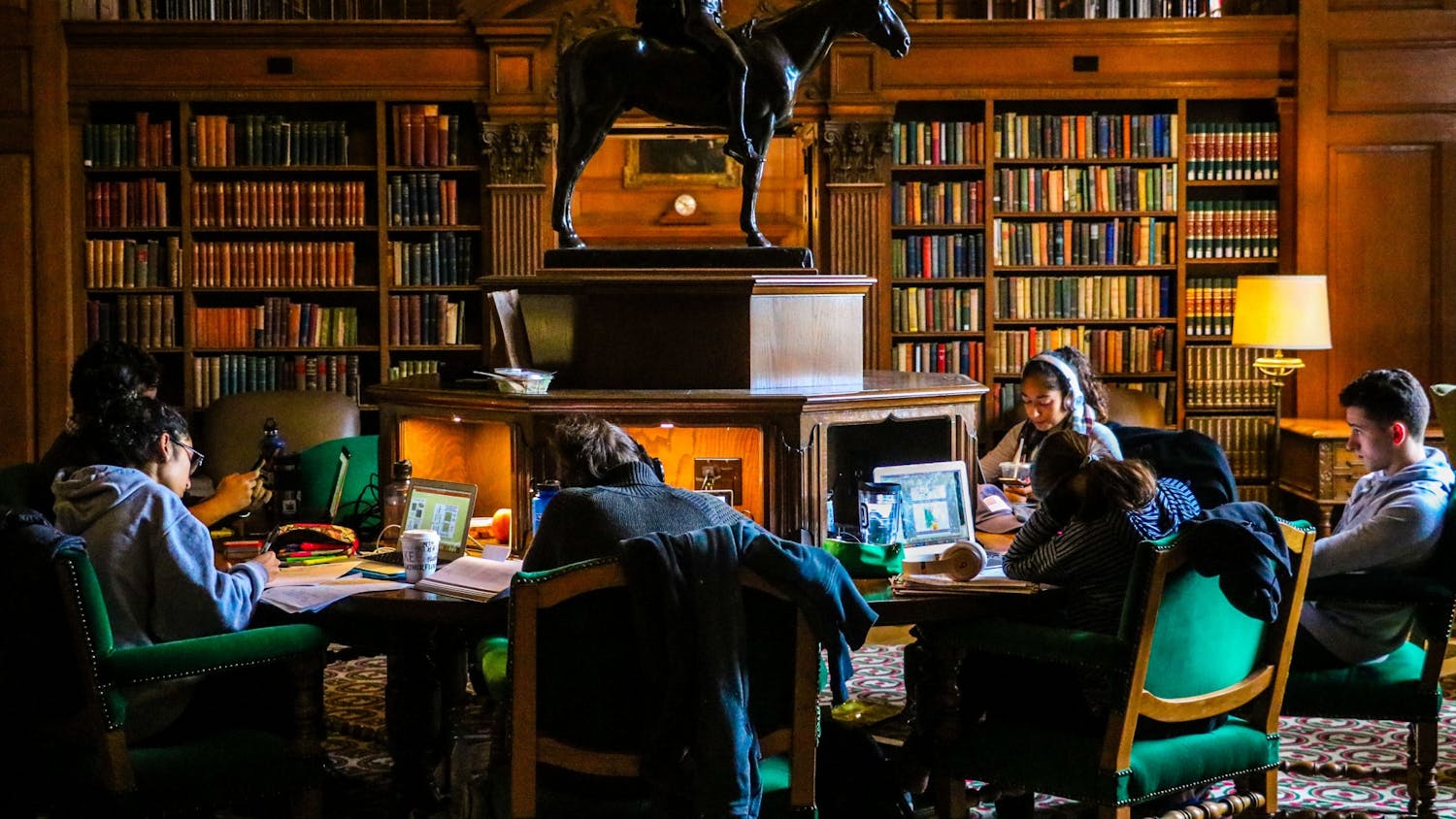For the first month of spring term, Dick’s House was unable to offer counseling services to students outside of New Hampshire due to licensing restrictions that prevented counselors from practicing out of state. After state and regional health boards loosened restrictions in light of COVID-19, the Counseling Center has explored new ways to connect with students as the College moves into its second term of remote learning.
For the last month, Dick’s House has provided counseling services online and has also hosted workshops and weekly discussion groups for students.
Until mid-April, as Dick’s House director and psychologist Heather Earle explained, ethical and legal concerns only allowed counselors to practice in the states where they are licensed. Since all Dick’s House counselors are licensed in New Hampshire, students who were patients at the Counseling Center received a message at the end of winter term notifying them that “due to licensing restrictions,” only those remaining in-state could receive teletherapy.
“This pandemic happened, and it just really really opened this issue up,” Earle said. “It really came to light, [the question of] ‘how are we going to continue to care for these students?’”
State laws regulate therapy licensing and practice, so counselors are generally allowed to practice only within the state in which they were issued their license. State regulations, however, are not always clear cut. For example, some states have guest licensure provisions that allow out-of-state licensed therapists to provide services for a short period of time.
Due to the pandemic, state governments and state health boards — regional departments charged with licensing — have altered licensing regulations for health care professionals, including therapists. Earle said that national health associations had been advocating across the country to loosen restrictions.
The Association for University and College Counseling Center Directors released a statement on March 14 lobbying state legislators, governors, state licensing boards and federal legislators to “[p]ass emergency legislation that would permit college student mental health and medical professionals involved in student mental health care to practice across state lines for a period of six months.”
In March, the Department of Health and Human Services relaxed constraints that had previously made it difficult to meet digitally with any doctor due to privacy concerns under HIPAA.
State-by-state, regulations also began to loosen as state medical boards loosened restrictions so that counselors can practice across state lines.
Starting in mid-April, the restrictions had been sufficiently loosened to allow Dick’s House counseling staff to practice in all 50 states, Earle said.
These services will continue to be covered by Dartmouth insurance for students enrolled at the College, despite being remote, Dick’s House associate director and psychologist Bryant Ford said.
On April 16, Dean of the College Kathryn Lively sent an email to campus announcing Dick’s House’s ability to provide services outside of New Hampshire. Following the email, Ford said that many students quickly reached out to the Counseling Center to schedule appointments.
Earle said that while Dick’s House will not have exact data on the number of students attending counseling sessions or workshops until about a month after the spring term ends, they are receiving “more and more calls from students” every day. Earle said the Center has heard from undergraduates and graduate students, including both those who had an established relationship with a clinician and those who did not.
Mental Health Student Union vice president Arya Kadakia ’22 said that the remote counseling sessions can pose challenges for students.
“Many students are used to the dynamics between them and their counselor,” Kadakia said, adding that many families are not used to the idea of students soliciting help from others.
Ford added that Wi-Fi access is an additional challenge when clinicians are disconnected from students.
Earle said that teletherapy can also be difficult for students with limited access to privacy. She said that some students have parents who are not comfortable with the idea of mental health therapy. To accommodate these students, Earle said that her office is looking into phone therapy to allow students to have a session while on a walk without internet access, though both Ford and Earle acknowledged that phone therapy can be a challenge due to the absence of non-verbal communication.
Earle said that Dick’s House plans to continue to provide teletherapy, as well as workshops and discussion groups, to enrolled students over the remote summer term.
Earle said that these discussion groups and workshops, which are held via Zoom, provide mental health information to students. For example, a four-part workshop titled “Attention Please” provides information and resources for students with ADHD. According to Dick’s House staff psychiatrist Da-Shih Hu, who co-facilitates the workshop, a total of 31 students attended the two “Attention Please” sessions in early May. Hu said that Dick’s House is now planning to offer the series every term.
Earle said that switching to remote programming has allowed the center newfound creativity.
“[Remote programming] opens up a whole new world,” Earle said. “How are we going to be creative? How can we get information to students that might not want therapy, who might not need therapy but who can really benefit from mental health information?”
Other workshops explore issues of nutrition, for example, an “Intuitive Eating” workshop that discussed healthy relationships with food. Dick’s House nutrition program coordinator and Dartmouth Peak Performance sport nutritionist Shira Evans, who facilitated the workshop, said that although she previously did outreach to students about nutrition and eating disorder awareness, the workshop is a new offering. About 30 graduate students attended “Intuitive Eating,” on May 20, according to Evans.
Evans will hold a second “Intuitive Eating” workshop on May 28 as a part of Fresh Check, the Counseling Center’s mental health awareness month programming, for which she said 19 undergraduate students have already signed up. Evans said that she plans to continue to offer “Intuitive Eating” in the following terms.
Thayer School of Engineering graduate student Meredith Bailey, who attended “Intuitive Eating,” said that the workshop was “very helpful.”
“[Evans is] very knowledgeable and … she also approaches [nutrition] with a lot of care and compassion,” Bailey said. “She really wants everyone to have the best relationship with food and just be more happy.”
Evans also facilitated a webinar for athletes on April 29 during which 17-time paralympic medalist Tatyana McFadden spoke about moving past trauma and still being able to perform. Around 75 athletes across a variety of teams attended the session, according to Evans. She added that she believed McFadden’s story offered a lot of “hope and inspiration” for attendees.
Cross country and track athlete Isabella Chao ’22, who heard about the workshop through DP2, said it was “awesome.” She said that she had previously learned about McFadden and thought her story was “so inspirational,” so she signed up for McFadden’s webinar as soon as it was offered.
“[McFadden] talked about what is to be stuck at home as a pro athlete, which offered perspective to us where we’re not alone in this,” Chao said. “We all have to get creative with how we go along with our daily lives.”
She said that she felt the College administration has “not been awesome” at handling COVID-19, but that the Counseling Center has done a “better job of managing what is going on and taking the student’s feelings and circumstances into account.”
“They realize that nothing here is standard so standard things aren’t going to fly,” she said. “Bringing in people to talk to us [and going] beyond the normal protocol makes us feel special and like the school is thinking about us.”
Chao said that she “applaud[s]” the Counseling Center for creating these workshops, adding that the Zoom meetings have the potential to give students “purpose.”
“[A remote term] can be so incredibly isolating.” Chao said. “Beyond just being able to hear somebody talk, you have somewhere to go, and you have someone to listen to that’s not you talking to yourself or your parents talking to you.”
Bailey also attended McFadden’s webinar, which she said was “helpful.”
“It’s really nice to see how [McFadden] views her situation with such a positive outlook and all the things she’s done with her positivity.” Bailey said.
Dick’s House also hosts weekly discussion groups via Zoom — such as for students living on campus and for international students — in addition to informational workshops.
Dick’s House staff member Alicia Key said that assistant dean of graduate student affairs Kerry Landers facilitated a group discussion in which international graduate students could voice their concerns. Fourteen students registered and seven students participated in the May 6 workshop, Key wrote in an email to The Dartmouth.
After the initial workshop, Key wrote that another discussion group for undergraduate international students was scheduled to take place on May 20 but was canceled due to a lack of interest.
The Counseling Center is planning to organize another discussion group for undergraduate international students on June 3, Key wrote.
Kadakia is a member of The Dartmouth staff.




